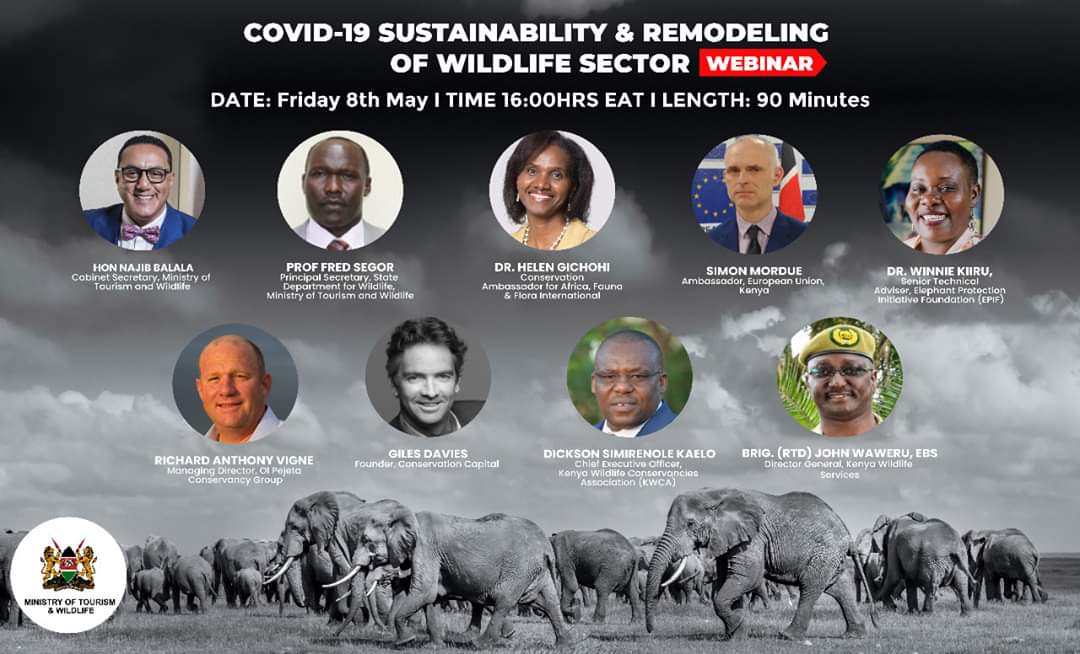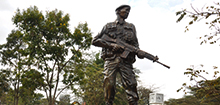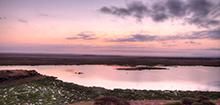
Date Published:
Tourism and Wildlife Cabinet Secretary, Hon. Najib Balala, has called on wildlife and conservation sector stakeholders to work with the government to enhance public-private partnerships to boost the sector.
“Public-private partnerships are key in boosting wildlife tourism and conservation. We need to have unity of purpose between NGOs, communities, conservancies and the private sector to carve new way forward post this pandemic”, noted Balala.
He made the remarks as he hosted a webinar, May 8, 2020, bringing together over 700 participants, under the theme: Covid-19: Sustainability and Remodeling of Wildlife.
The webinar, moderated by Fauna and Flora International’s Conservation Ambassador for Africa Dr. Helen Gichohi featured presentations by eminent wildlife and conservation policy-makers, experts, investors and the regulator:
- H.E. Simon Mordue: European Union Ambassador to Kenya
- Prof. Fred Segor: Principal Secretary, State Department for Wildlife, Ministry of Tourism & Wildlife
- Mr. Giles Davies: Founder, Conservation Capital
- Dr. Winnie Kiiru: Senior Technical Advisor, Elephant Protection Initiative Foundation (EPIF)
- Mr. Dickson ole Kaelo : CEO, Kenya Wildlife Conservancies Association (KWCA)
- Mr. Richard Vigne : MD, Ol Pejeta Conservancy Group, Kenya
- Brig. (Rtd.) John Waweru: Director General, Kenya Wildlife Service (KWS)
Speaking during the webinar, Brig (Rtd.) Waweru, called for a re-modeling of the wildlife sector by effectively deploying technology and shared how KWS will be making investments to do so. Some of the initiatives will include the use of technology to identify and monitor animals as well as designing targeted educational and conservation programmes.
Dickson Kaelo on his part urged county governments to work closely with the national government and wildlife stakeholders to improve the sector. He said that such an approach would ensure that the country’s Wildlife National Strategy, the Wildlife Act and other sector policies are implemented effectively and in a coordinated approach.
Sharing from the successes of the Ol Pejeta Conservancy’s integrated land use model, Richard Vigne emphasized a greater focus on productivity and profitability. To do this, he noted that the sector would need a product revamp with a focus on immersive experiences to drive value for money and ultimately bed nights. He also called for the use of technology platforms to drive virtual conservation and wildlife experiences.
Building on Mr. Vigne’s presentation, Dr. Kiiru reiterated the importance of a unified effort in the sector to create sustainable financing and governance models to ensure the overall success of the sector in the long-term. She advised that such efforts must drive the communities living in those conservancies too.
Giles Davies called for greater efficiencies in the sector even as he advised that to ensure sustainability; players in the sector would need to diversify revenue streams, with a greater focus on the domestic market as the first point of recovery efforts.
Ambassador Mordue drove the point home by saying, that the sector should not expect to go back to their pre-COVID-19 numbers, but that instead they should expect a ‘new improved normal’ if they focused their efforts on diversification given that the over-reliance
of conservancies on international tourism was a major risk. He called for greater efforts to involve the youth in conservation efforts across the country as climate change proponents.
CS Balala in his concluding remarks pointed out the need to deal with certain risk factors in the sector involving human wildlife conflict, community user rights and financial sustainability. He called for concerted efforts to stem the conflicts while enhancing user rights. Regarding financial sustainability, he called for the creation of a Wildlife Endowment Fund to sustain the sector.
Dr. Helen Gichohi brought the 90-minuted webinar to a close by reminding the participants that tourism and wildlife cannot exist without each another and that they both play a vital role in boosting the GDP of our country.





